If you’re only using keyword and topic ranking for your search and web marketing efforts, then you’re missing out on an opportunity to boost your social media engagement. Knowing what your audience is talking about and how they’re talking about it on social channels will help you to:
- Craft relevant messages for social media posts.
- Provide topics for new content creation.
- Stay ahead of the competition with better audience targeting.
- Discover new, relevant keywords and topics to engage your audience.
Finding Relevant Keywords for Content Creation
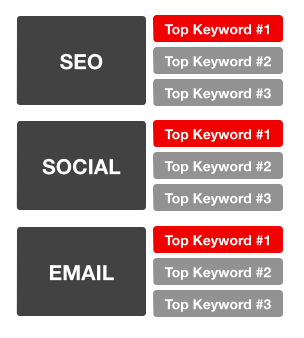
There are many ways to find out what keywords are driving traffic to your content, although there are fewer now because of Google’s keyword not provided update last year. Whether you’re in charge of SEO at your brand, or someone else is, start with a list of current tracked keywords including rank and search volume.
You’ll want both rank and search volume data to understand which topics are currently working well and which are not working well for your brand. You’ll also want to know if keywords are getting enough volume to make them worthwhile. It’s not enough to rank highly for a keyword, you’ll want relevant keywords that your audience is using when they’re searching for solutions in your industry.
While single keywords that are ranking highly, but have a low search volume, may not be worth your time creating content around, the same is not true for long-tail keyword phrases. If there’s a question or phrase that’s specific to your product or service, that keyword phrase is most likely used by folks who are further along in the sales cycle and closer to conversion. A long-tail keyword phrase that closely matches your messaging is worth creating content for even if the search volume is very low. The chances are, all those people are in the purchasing phase and your investment will be directly related to sales conversions.
If there isn’t someone at your organization who’s responsible for SEO, ask around to see if there’s currently an analytics platform or measurement in place that’s capturing this information. If you have Google AdWords, you can use the Google AdWords Keyword Planner tool to take a look at some keywords and search volume projections. There are a ton of keyword tools out there to help you get basic ranking and search volume information, or you can take a look at using GinzaMetrics.
Using Keywords to Improve Social Media Efforts
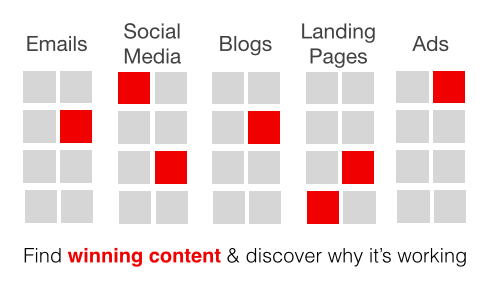
Once you have a list of the search keywords driving traffic to your content, compare them against keywords and phrases being discussed on social media channels. If you find your search keywords are also ranking well on social media, use those topics and phrases in your social media posts. Share the content that your audience is already organically interested in that is ranking highly on search engines.
To differentiate the message from the medium, test to see how keywords perform on search versus social. You may find keywords that lead to conversions on one medium, such as Twitter, are different from the keywords that lead to conversions on another, like Facebook. Once you have that information, you can have more productive conversations with your audiences on the channels that they use.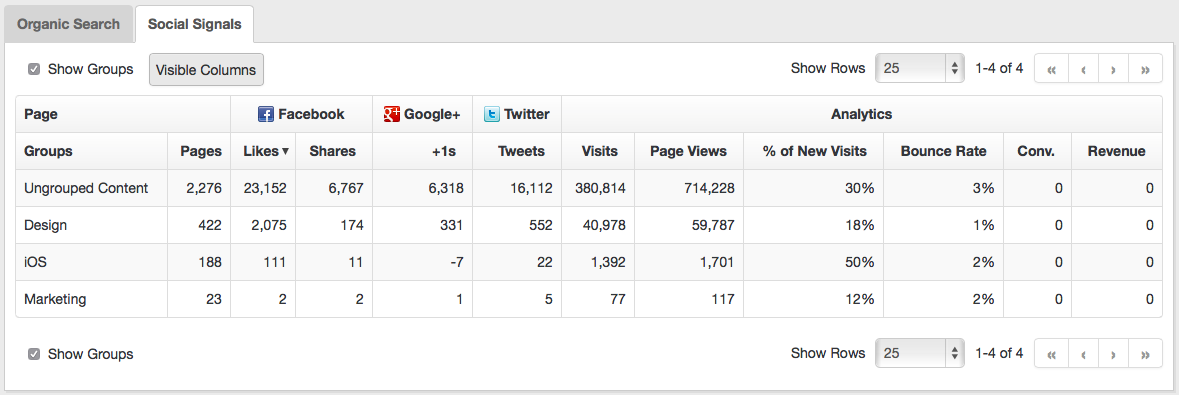
After you’ve isolated the keywords you want to use for each medium, test out different methods for distributing that message. For instance, if you’re currently sharing a blog post on Twitter and Facebook around a popular topic and it’s working really well, consider taking that blog content and creating Slideshares, videos, ebooks, or ads. If your audience is interested in your message as a blog on Facebook and Twitter, they’re probably interested in it elsewhere and in different mediums.
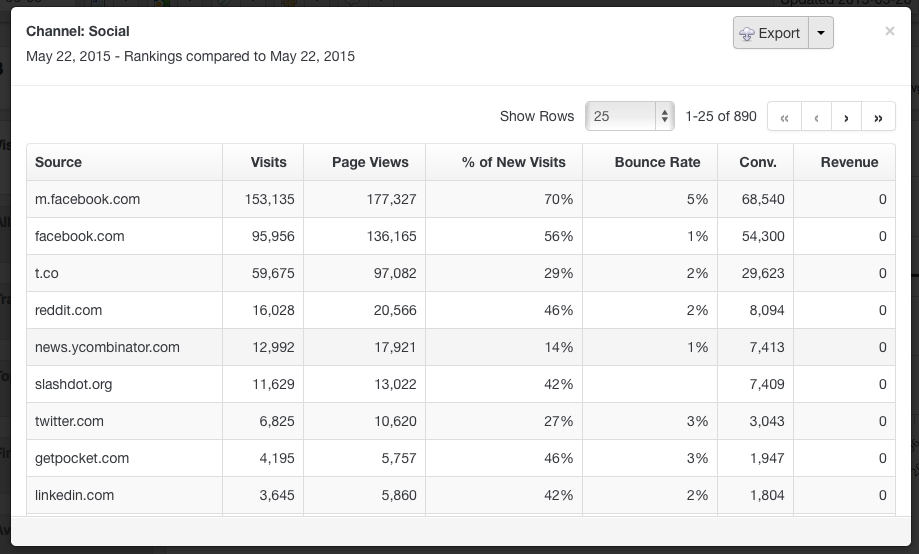
Leveraging Competitor Data
When you begin looking at keyword ranking data to identify popular topics and content ideas, leverage your competitor’s information to give you an advantage in your marketplace. Here are a couple of good strategies to use competitor content and keyword rankings to boost your social media effectiveness.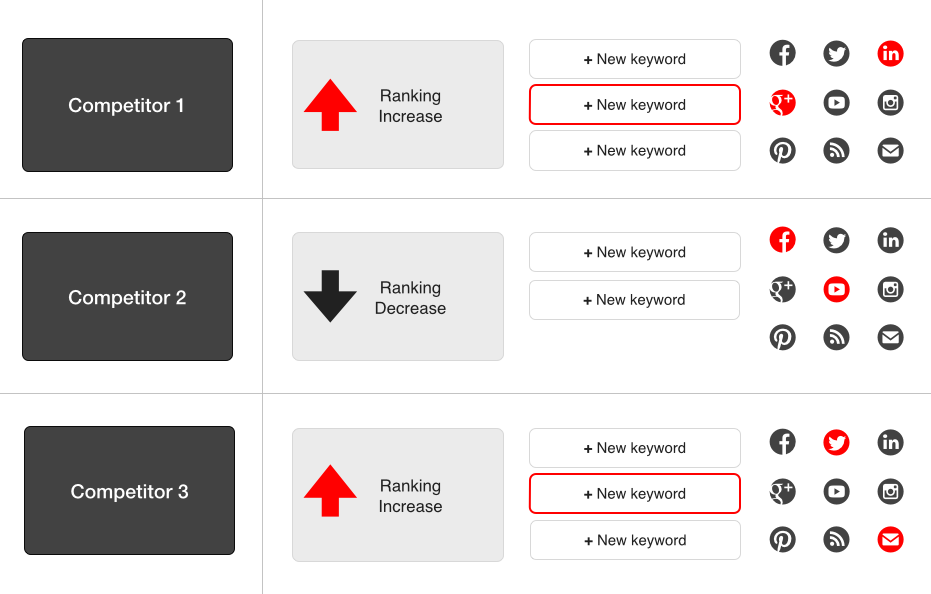
- Watch how competitors rank for the same target keywords and topics you’re already tracking.
- For higher ranking keywords, discover what content they’re creating to drive engagement.
- Sort competitor content by high sharing volume on social channels.
- View content by Facebook likes, shares, Tweets, etc.. to identify topics with high audience interest. Look at the keywords associated with those pieces of content and with the content medium to discover if that strategy will work for you.
Knowing what keywords and topics are driving your audiences to your competitors gives you the opportunity to get that audience back by creating content around the same topics. However, you don’t want to blatantly copy another brand’s content. It’s bad for SEO and generally just lazy marketing that doesn’t pay off in the long run. Instead, create a new spin on someone else’s content.
 For example, if your competitor wrote a really great Content Marketing 101 Guide that’s available for download as a PDF on their site, you could create a video series, a slide share, or an infographic on the same topic, using your own original, relevant content. Now your audience can get the content marketing information in a format that may be more appealing to them.
For example, if your competitor wrote a really great Content Marketing 101 Guide that’s available for download as a PDF on their site, you could create a video series, a slide share, or an infographic on the same topic, using your own original, relevant content. Now your audience can get the content marketing information in a format that may be more appealing to them.
Keyword and Content Groups
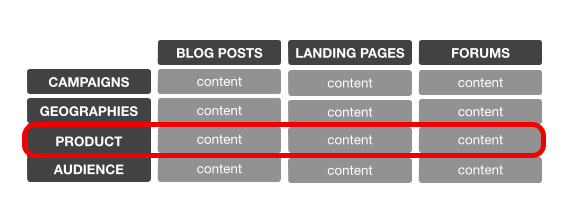 Creating keyword and content groups is really important and makes the data easier to handle and to use. Creating keyword and content groups allows you to segment out what content and keywords go with:
Creating keyword and content groups is really important and makes the data easier to handle and to use. Creating keyword and content groups allows you to segment out what content and keywords go with:
- Product features
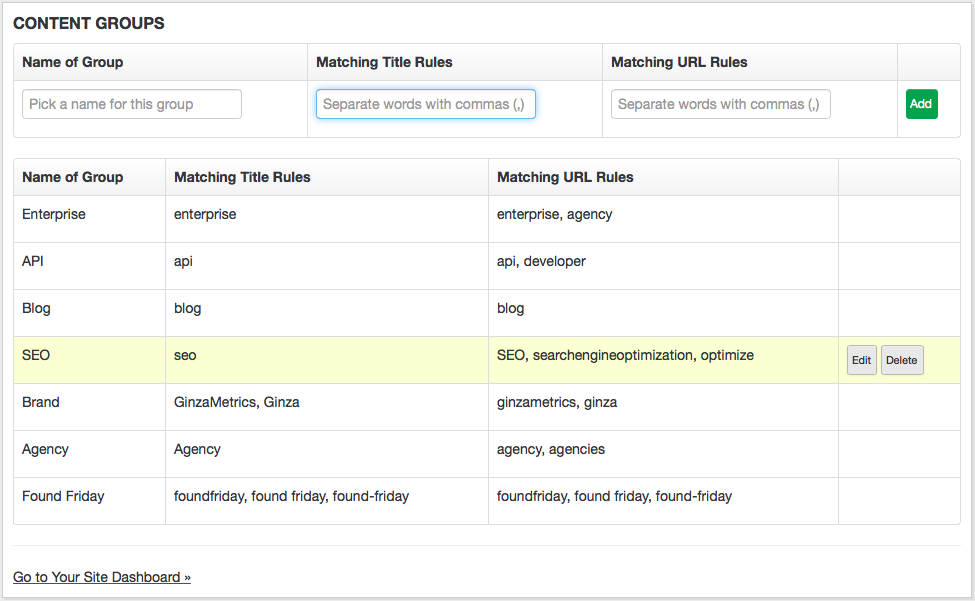
- Product lines
- Marketing campaigns
- Geographies
If you set up your keyword and content groups, then you can create messaging that focuses on one of those specific areas and focus on all the aspects of that message:
- Content
- Competitors
- Keywords
- Social Media
Discovering New Keywords and Topics For Social Media
Keyword and topic discovery is an often overlooked step in creating better social engagement. In addition to the keywords and topics you’re already tracking, you’ll want to find adjacent keywords that are also of interest to your audience and consider creating content and social posts around those, as well. This will help you create a community and provide helpful information to your audience.
For example, if my brand sells trail running shoes, in addition to talking about trail running and shoes, I might want to talk about current trail conditions in different places, best trails around the country, or engage my audience with weather updates on their favorite trails, or any other topics they may be talking about with others in the space. Marketers often miss out on opportunities to participate in good community conversations because we are too focused and singular about our topic focus.
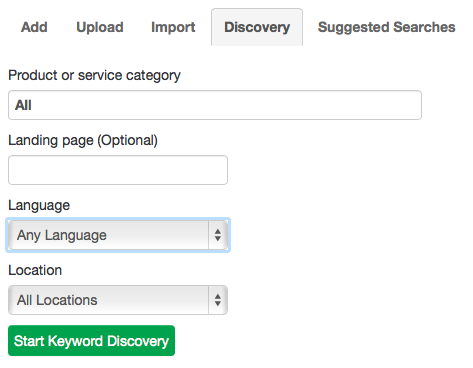
This is a core concept in content marketing – which is generating relevant content will get you found and shared. If you’re selling running shoes, your audiences are going to be interested in marathons and 5Ks. Give them information about how to get into races, or what to do if they become dehydrated, or whatever the hot topics are. Being helpful, in general, helps your brand to create trust and a presence, a position of thought leadership, in your own industry.
Having conversations outside your specific product or service also gives you more information to write about beyond what you’re already doing. A lot of times we struggle when it comes to social because we are too reactive. Because creating content is already time consuming and overwhelming, we simply wait to see what someone else is saying and then respond. Using adjacent keywords gives you the opportunity to create proactive social media and provides you with more interesting things to share. Once you’ve expanded the number of available topics to create content and posts around, you may also find niche market areas ripe to expand product offerings. Discovering adjacent keywords can provide insights for more than just the social media department.
Keyword Data and Audience Engagement
After you’ve used your keyword data to write posts and create content, the process comes full circle. Watch which social posts are performing best and what content is resonating with your audiences on your social media channels. Discovery boards are a great way to track audience conversations across all the social mediums. Discovery boards can take the form of a spreadsheet or a word document, whatever works best for you. To get started with a discovery board, go to forums, Facebook posts, Twitter, and other social channels and listen in on what people are talking about. Look for and record:
- Problems
- Suggested solutions
- Tools in use
- Practices in use
- Keywords/phrases used
- Features
- Track those things that repeat
From this information you can decide what people are talking about, how they’re talking about it, and what kind of messaging you can develop to directly address that issue or concern. Add the keywords that you find repeatedly to your list of tracked and targeted keywords if they aren’t already there – and be sure to work with your SEO department and keep them informed.
You can also track who the thought leaders are and who tends to answer these questions. From there you might identify competitors, or future brand evangelists.
The Symbiosis of Social and Search
 Sharing data between search and social functions works because the audiences on both these channels are there by choice and through a desire to look for and talk about topics. Using their words to reach them makes sense, and the probability is, if they’re looking on search, they’re talking about it on social, too.
Sharing data between search and social functions works because the audiences on both these channels are there by choice and through a desire to look for and talk about topics. Using their words to reach them makes sense, and the probability is, if they’re looking on search, they’re talking about it on social, too.
By using the data from each of these channels, and by examining how people are talking about specific topics and channels, you can enhance your user experience across all marketing mediums. If you’re not already talking about search and social together in your organization, it’s time to start having that conversation.

